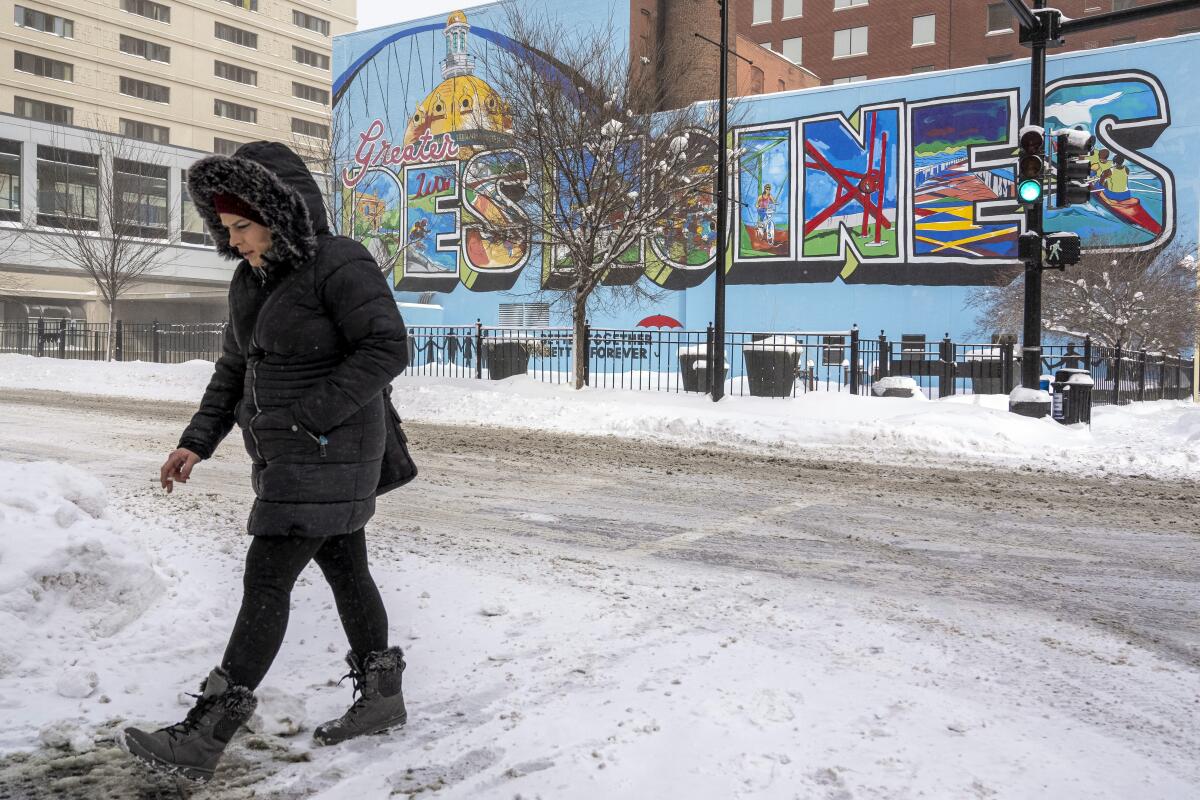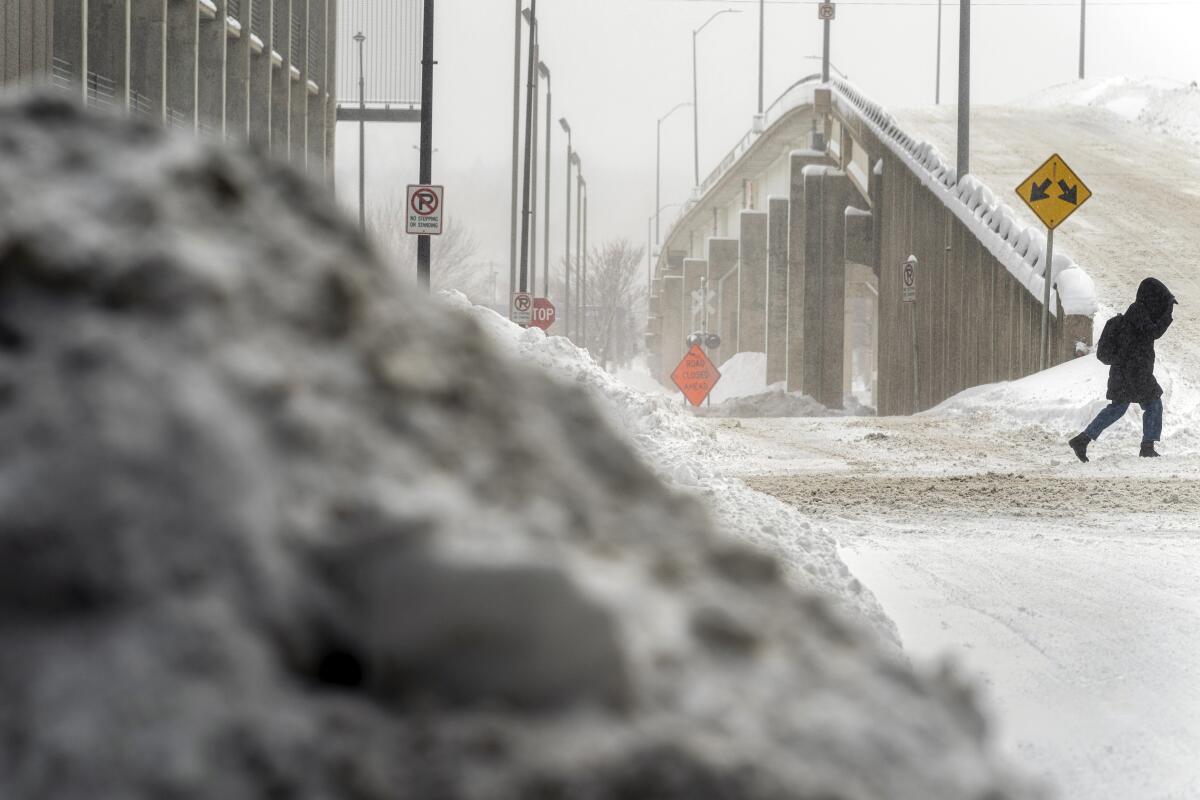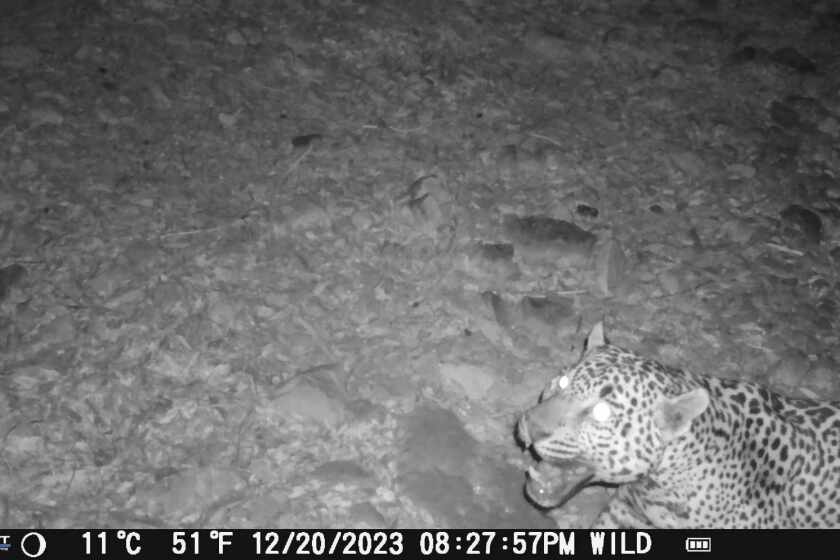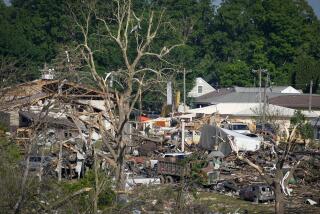Iowa’s winter blast could make an unrepresentative way of picking presidential nominees even more so

- Share via
DES MOINES — Most Iowans won’t be out Monday night. Never mind that it’s forecast to be well below zero, with wind chills as low as minus 40 degrees, and the roads may still be icy from a set of snowstorms that hammered the state this past week.
It’s because they’re not registered with the Republican Party, which is kicking off the presidential nominating season with its famous caucuses. Or because they don’t want to make the commitment to attend, which involves getting to the nearest of 1,500 caucus sites and sitting in a room — potentially for hours — for the chance to vote on the party’s presidential nominee.
But the winter weather, intimidating even for Iowa, will make an already unrepresentative process even less representative. Elderly Iowans, the backbone of the caucus, are wondering how they will make it to their sites Monday. Political types are mentally downgrading their expected turnout and wondering who a smaller, harder-core electorate will favor.
All this gives longtime critics of the caucus even more reason to be critical.
Jason Miller photographed the jaguar on Dec. 20. It’s the eighth individual jaguar spotted in the wild in the U.S. since the 1990s.
“This is no way to begin the election of a president,” said Julian Castro, a former San Antonio mayor and federal housing secretary who was a Democratic presidential candidate in 2020, when he called for Iowa to have a less prominent role. “You have to be a die-hard who’s willing to trudge through snow and be there for several hours. And if you miss it, your opportunity to vote is gone.”
Democrats already have downgraded Iowa after the state party bungled the vote-counting in the 2020 caucuses. Democrats have relegated the state to later in their nominating process after President Biden declared that he wanted more diverse states that better represent his party and the country to cast the first votes. That party’s process starts in South Carolina on Feb. 3, then moves to Nevada, with New Hampshire next in the new order for 2024 even though the state party is going ahead with a Jan. 23 primary that national Democrats say won’t count.
But Republicans have stuck with Iowa, which once was competitive but has swung firmly to the right in the age of Donald Trump, who carried the state in the general election in 2016 and 2020. Its population is whiter, more rural and evangelical than the nation, but that matches the GOP’s voters better than the Democratic Party’s.
Some Republicans expect a still-robust turnout, but most acknowledge the weather will scare at least some voters away.

IoOo
“This’ll be worse than we’ve ever had,” said Doug Gross, once a top aide to former Republican Gov. Terry Branstad, who said his own 90-year-old mother had decided she couldn’t caucus in these conditions. “It’s going to dampen turnout.”
Brad Anderson, state director of AARP Iowa, said older voters historically decide who wins and loses the contest because “the caucuses do tend to trend older in terms of turnout.”
This caucus might be “somewhat of an outlier,” he said.
The cold and potential snow drifts, especially in rural parts of the state, make conditions “treacherous” for people of all ages, Anderson said. He advised extreme caution, especially for those with mobility issues, and hopes Iowans will take safety into account.
One older woman who lives in a retirement home in Newton telephoned Thad Nearmyer, chair of the Jasper County Republicans, saying she still drives but would be “a bit more comfortable going if somebody else was driving,” he said. She will be asking friends, family and neighbors for a ride to Monday’s caucuses.
It would be a huge undertaking for the county party to organize rides widely, but Nearmyer recommended that those who want to attend a caucus reach out to friends, family and neighbors.
“You know, if it was right now with this wind whipping and snow, nobody would be able to make it,” Nearmyer said Friday. “But I think we’ve got time for the roads to clear, the wind to die down. I think it’ll be pretty well-attended.”
Even under better conditions, only a tiny fraction of Iowans even participate in the caucuses. In 2016, 186,000 votes were cast in the Republican caucus in a state population of more than 3.1 million. And that’s what provides the most important kickoff to the contest to lead a nation of 330 million people.
The caucuses are a relic of the push to reform party nominating processes in the 1970s, freeing them from the influence of party bosses. They helped vault underdogs such as Democrats Jimmy Carter and Barack Obama into the White House.
Caucuses tend to favor movement candidates — liberal Democrats and conservative, increasingly evangelical Republicans — whose supporters are more willing to carve out time on their calendar and dominate the caucus room.
The small size of the event, and of Iowa overall, is part of the pitch, said Rabia Belt, a Stanford law professor who has been critical of the caucuses.
“There are conflicting desires in crafting the nominating process,” Belt said. “If you start with large states, or states in expensive media markets, that creates barriers to potential candidates who may not have a lot of money or organizational power at the outset. Also, a small state can allow candidates to tailor their messaging and work on their retail political game during intimate conversations with committed and interested people.”
Seth Masket, a political scientist at Denver University, was preparing on Friday to take 13 of his students to watch the caucuses. He was bracing for the weather, but also for the randomness of the American nominating process.
“No one would ever design this intentionally,” Masket said. “No one would ever design something where the most important contests are in Iowa and New Hampshire — in January!”
More to Read
Sign up for Essential California
The most important California stories and recommendations in your inbox every morning.
You may occasionally receive promotional content from the Los Angeles Times.














